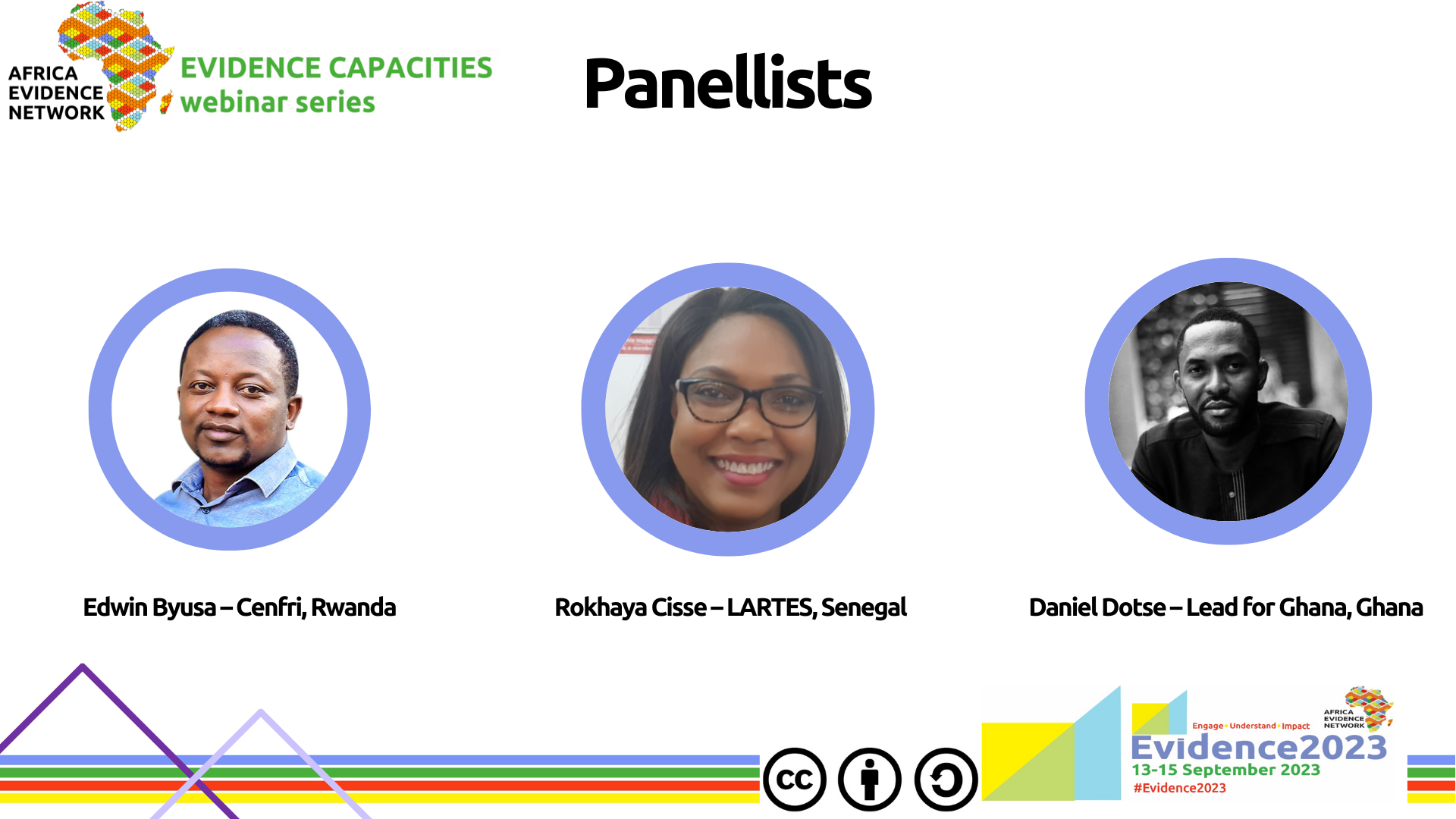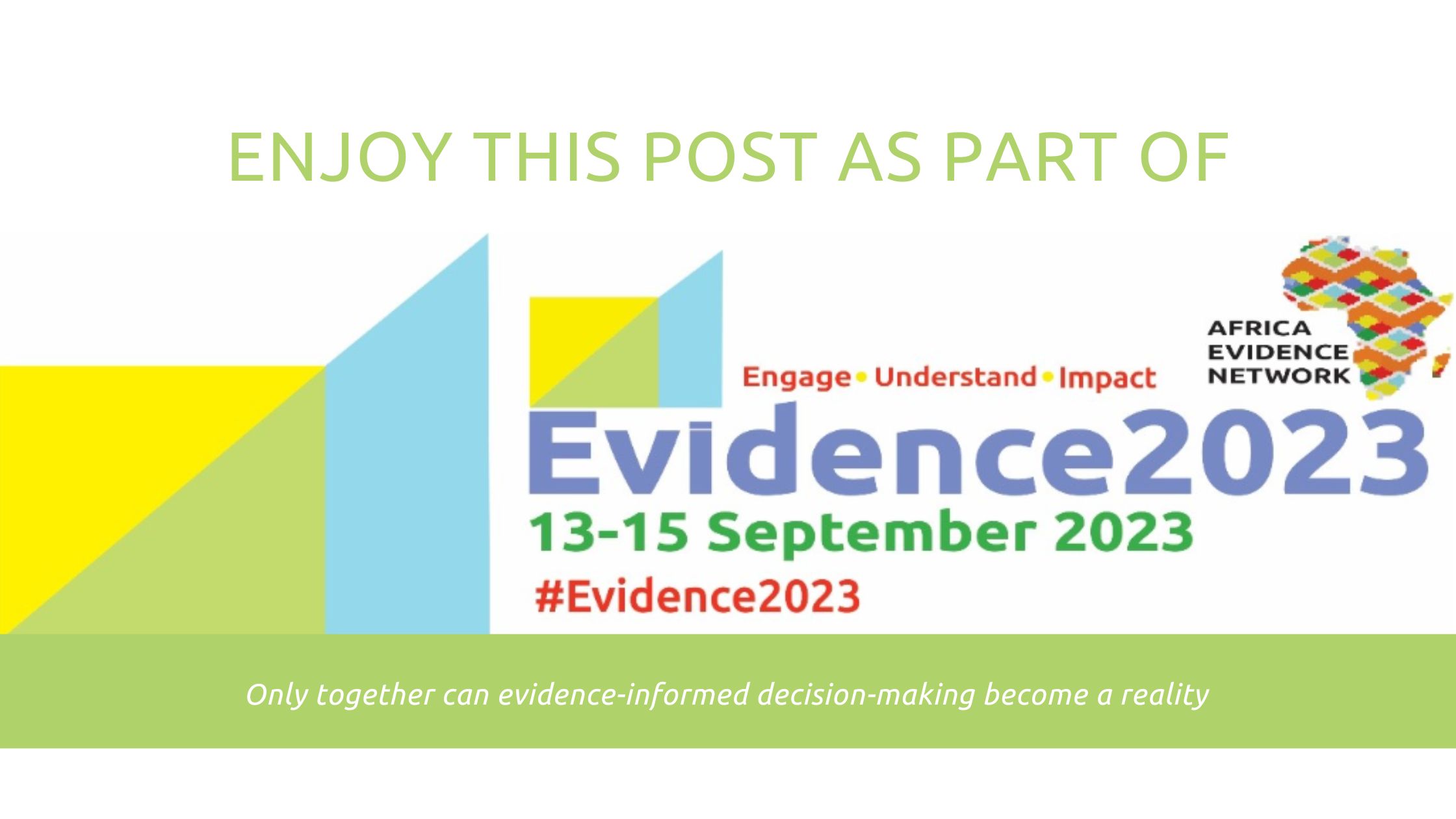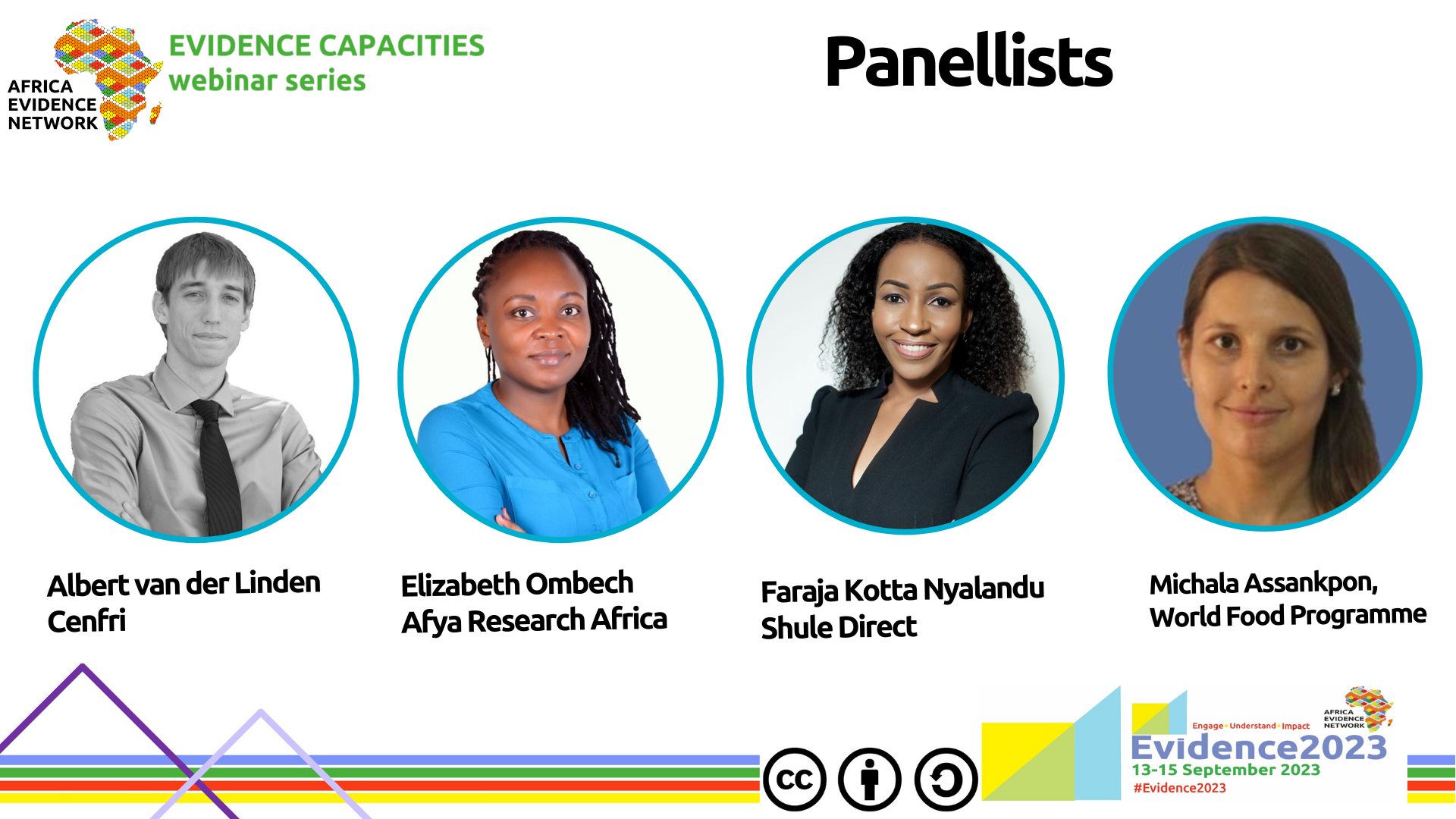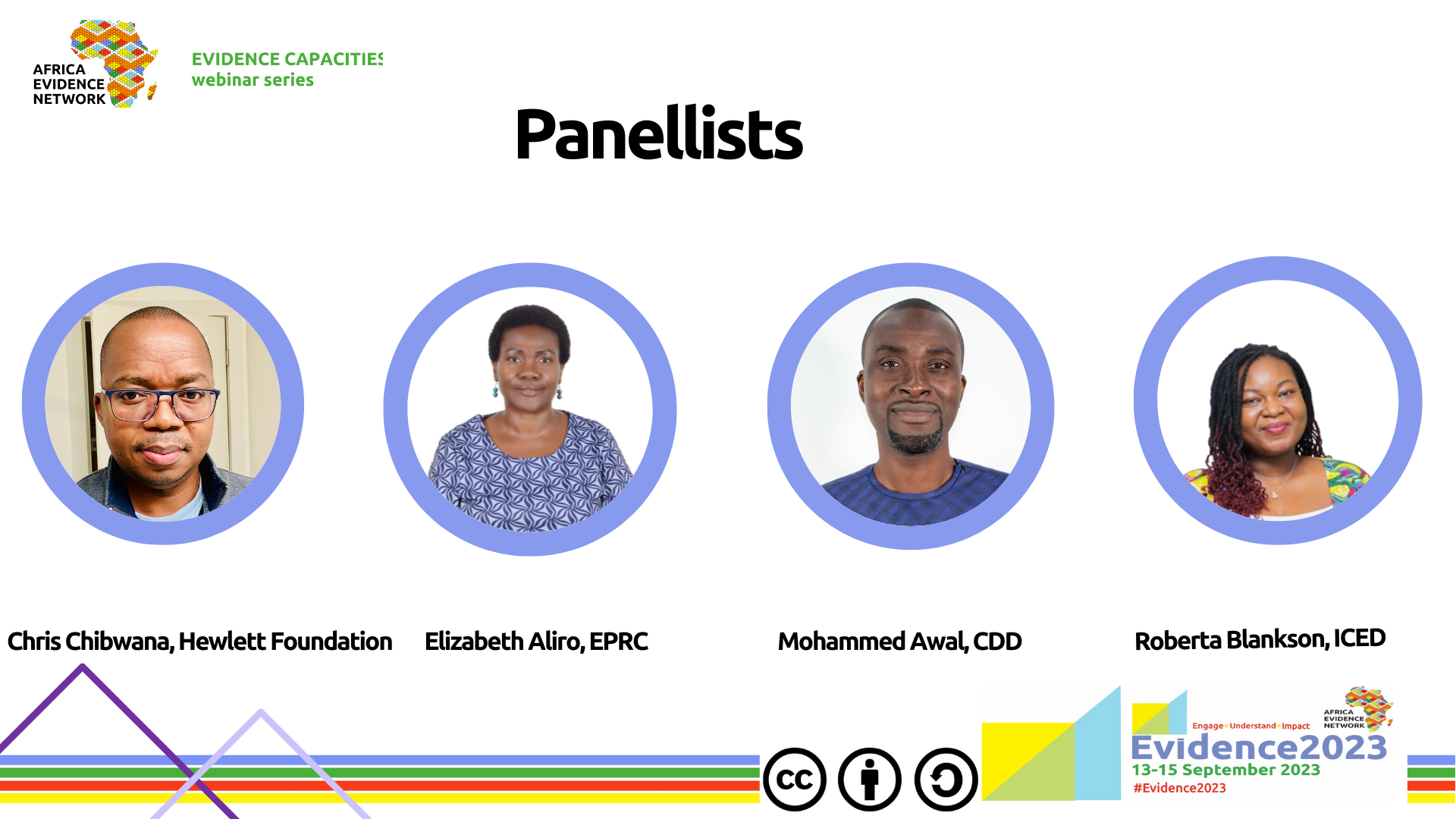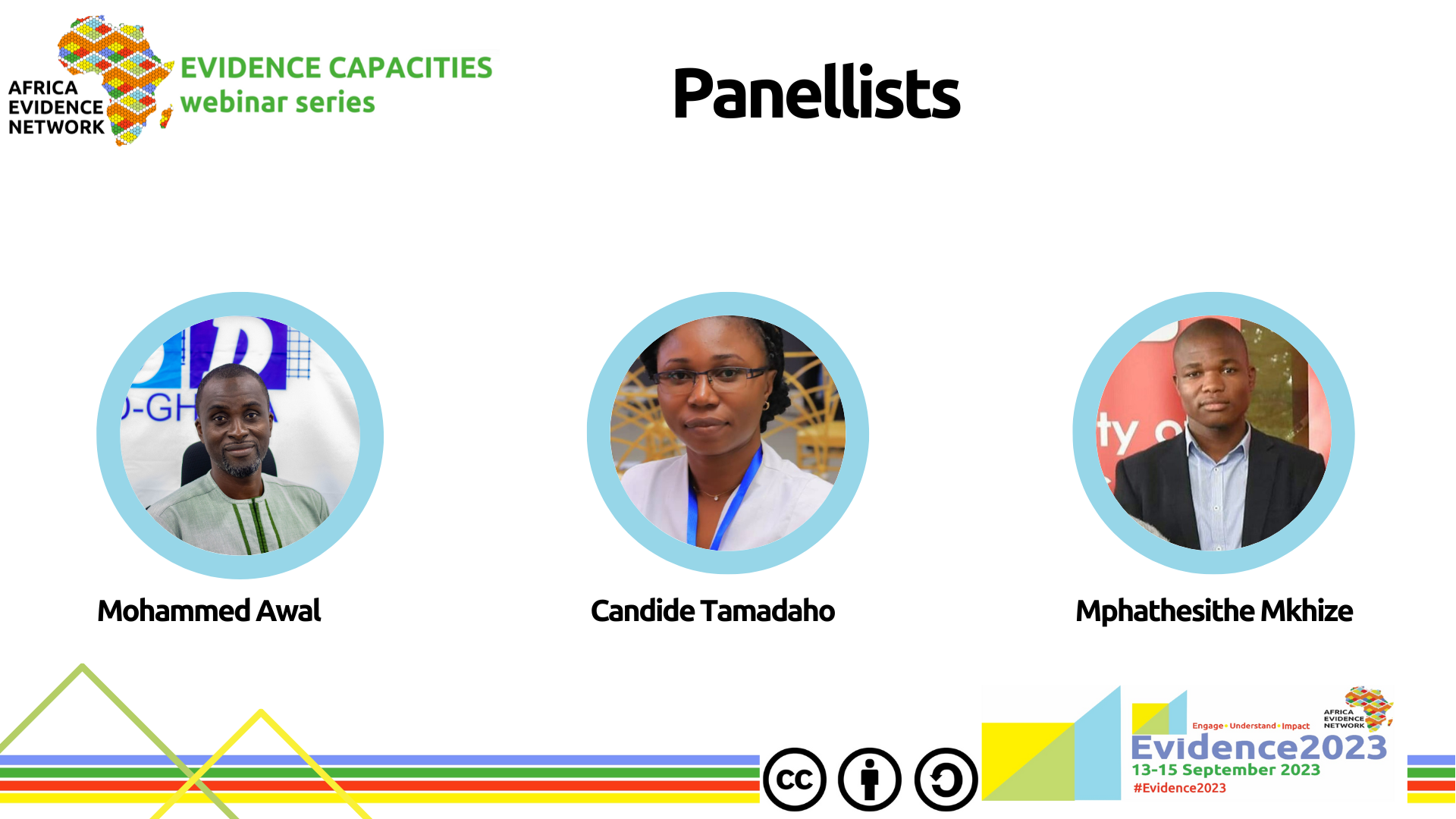
If you are interested in this topic, kindly review the webinar presentation or watch the recorded webinar.
This blog post is based on the fifth webinar of the Evidence 2023 capacities webinar series hosted by the Africa Evidence Network (AEN). The AEN Evidence 2023 capacities webinar series aims to create a platform for sharing experiences and ideas that push our thinking on how (approaches) we enhance capacity for evidence use in Africa. The series also strives to generate ideas on addressing structural and value issues for wider ecosystem strengthening efforts. It is also our hope that these discussions will be the basis for improving and illustrating the AEN's Manifesto on capacity development for evidence use in Africa.
The AEN is considering the possibility of setting up a Community of Practice that is focused on Citizen Evidence or Citizen Science. In view of the vastness of the subject matter therefore, the Enhancing Evidence Capacities Working Group dedicated this webinar to explore foundational knowledge within the network on citizen evidence. This was an obvious deviation from the previous four webinar sessions, which focused directly on innovative approaches for evidence-informed decision-making (EIDM) capacity development in Africa and their implications for different actors. This current blog post presents a summary of discussions from network members on citizen evidence.
Empanelled actors
Deo Gracias Houndolo of 3ie did an amazing job in moderating this interesting and insightful session among Mohammed Awal from the Centre for Democratic Development, Ghana, Mphathesithe Mkhize from the University of KwaZulu-Natal, South Africa and Candide Tamadaho from Institut le Baromètre, Benin. Exchanges among this brilliant bilingual team on the subject-matter were a clear demonstration of efforts put in place by the AEN to facilitate equal participation of both French and English-speaking members within the African evidence ecosystem. The session was chaired by Siziwe Ngcwabe, Director and Co-Chair of the network.
The state of production, intermediation and use of citizen evidence across different ecosystems
In South Africa
Mphathesithe Mkhize shared insights on how citizen evidence is embraced by the South African government in all its activities. The EIDM culture within the South African government gives access to the production of research evidence from different actors across different sectors e.g. civil organisations, researchers, academicians. To support this, government established a dedicated Department for Monitoring and Evaluation to monitor policies, programs and projects through a system called the government-wide platform for monitoring and evaluation. Quite some efforts are also done in ensuring the voices of citizens are captured (community evidence) within research conducted by academics.
In Ghana
Mohammed Awal shared distinctive efforts by his organisation in facilitating the collection of citizen-generated evidence to inform policies and practice, an activity that dates as far back as 1999 with the establishment of the Afrobarometer survey. Today the Afrobarometer survey operates in approximately 40 countries providing access for citizen voices to influence policies. Overtime data from these citizen-generated longitudinal surveys, with feedback on democracy, governance, accountability and service delivery, has become very useful in informing policies and practices both at national and regional level.
Still in Ghana, at the subnational level, civil societies are doing tremendous efforts in enhancing citizen evidence through the collection of SDG-related community data for advocacy. They equally monitor SDG-related activities ensuring no one is left behind in terms of development outcomes provided to citizens. Citizen-generated evidence is therefore becoming more and more valuable in Ghana, especially when localized citizen data is combined with official statistics to monitor and provide feedback that shapes policy outcomes. Noticeable improvement and efficiency is being observed in this part of Africa with respect to the way public resources are used to address citizens’ needs, with more and more citizens engaging and providing feedback when needed.
In Benin
Quite a number of initiatives are in existence to facilitate the generation, mediation, and use of citizen evidence. To ensure the trustworthiness of citizen-generated evidence, both digital and non-digital platforms are established by civil society to enhance the validity of these policy-relevant resources. The trustworthiness of these platforms are recognized by the Government of Benin, thereby facilitating the uptake of citizen evidence by policy makers through these platforms. The revolution of technology comes as an added advantage in facilitating the generation of citizen evidence and their accessibility by both policy makers and the citizens. Real-time evidence for reducing electoral fraud, minimizing road accidents and medical negligence is gathered on social media platforms from citizens’ voices. “Pictures and videos from citizens could also count as evidence” said Candide Tamadaho when she sought to validate what more should be considered as evidence in the eyes of researchers.
Actors Promoting Citizen Evidence Across different Ecosystems
In Ghana
Civic groups, community-based organisations and social activists are strong actors in the production, mediation and promotion of citizen evidence. Community members also play a key role in ensuring the availability of citizen-generated data in town-hall meetings, community debates and engagements. Some policy makers have equally demonstrated interest in citizen evidence by creating spaces and opportunities where citizens’ voices influence policy formulation.
In Benin
The state is one of the key actors promoting citizen evidence in Benin, through the establishment of institutional and regulatory systems to facilitate the availability of these pieces of evidence. Government in Benin has played a key role in facilitating access to digital infrastructure almost across the whole state, despite some challenges associated with setting them up in hard-to-reach settings. The state has equally established an institution specifically for the protection of personal data (l'Autorité de protection des données à caractère personne, APDP). This institution plays an influential role in Benin on limiting irresponsible divulgation of data and the punishment of data privacy infringement. Private digital institutions, independent media houses have also established some initiatives to facilitate the collection and sharing of information. Other organisations like le Barometre are actively engaged in the capitalization and the generation of citizen evidence. Some products from le Barometre are those related to the SDGs. This particular tool has been developed to be used at decentralized levels to monitor SDGs outcomes and collect data from the community. This innovation has been structured that policy makers at both central and decentralized levels, can have access to real-time data collected from citizens. Civil societies groups are also one of those actors quite active in facilitating the production and use of citizen evidence in Benin.
In South Africa
Civil society organisations help facilitate the production of citizen evidence and also stand as the representatives of citizens. They are fully engaged in ensuring citizens’ voices are heard in public policy decision-making process.
Challenges to the production, Intermediation and use of Citizen Evidence across different Ecosystems
Some of these challenges highlighted by the panelists include:
- Limited resources at subnational levels for the effective engagement of citizens in generating citizen information;
- Marginalization of non-digital citizens who are most often left-out in the process of generation, and use of citizen evidence;
- Absence of integrated approaches to generate citizen evidence. This creates a situation where very little of citizen evidence is used by policy makers, despite the great amount of these resources produced; and
- Difficulty in ensuring citizens see the value of their own voices and feedback in relation to the public resources spend on programs and practices addressing their everyday needs for development outcomes that impact their communities
Recommendations in advancing the production, intermediation, and use of citizen evidence in the Future
This webinar created an opportunity for the panelists to voice out their opinions on what can be done differently in our various settings in promoting the generation, and use of citizen evidence. Some key recommendations were:
- Ensuring citizens feel involved in the process of producing, intermediating, and using citizen evidence;
- Creating more awareness on the value of citizen evidence;
- Bringing together collective efforts in promoting citizen evidence;
- Promoting strategies that can enhance the participation of citizens living in hard-to-reach rural communities with limited access to digital technology;
- Timely use of citizen evidence to inform decision;
- Dedication of more time and effort by civil society in the process of aligning citizen-generated data to government statistics;
- Investing in systems and infrastructures to facilitate continuous feedback from the community that inform policies and practices;
- Enhancing research and technical capacities of communities mediating community interest in public policies and practices;
- Timely communication of citizen-generated evidence to influence policies and its impact;
- Building capacities of citizens with tools useful in generating citizen data; and
- Establishing collaboration among policymakers and private sector actors to promote initiatives put in place to enhance the generation and use of citizen evidence.
Questions and answers
The webinar ended with a thought-provoking question on how to measure the quality of citizens’ engagement. In response to this question, Mohammed shared an example of what is done in Ghana by measuring citizens’ engagement through the participations of the citizens in established forums. “It also greatly depends on how the forums are structured e.g. language used and the subject matter being discussed. You could also measure based on their level of engagements, as well as actions they put in place after leaving the forums. With regards to the quality of their engagements, experience from Ghana showed that citizens are more likely to make their voices heard when giving feedback on salient issues affecting them directly” he concluded.
About the author: Penka Bogne (a Rachel Des Rosiers fellow- Canada) is a young Cameroonian female researcher, lead evidence broker (storyteller) at eBASE Africa and a PhD student in health sciences. She is equally the vice chair of the GIN African regional Community. Engaged in promoting EIDM in Africa with an emphasis on francophone Africa. She has carried out capacity building, knowledge translation and research evidence dissemination activities to policymakers, practitioners and community members (specifically non-digital, Indigenous and underserved community members). Penka is an Award-winning traditional storyteller. She has led the development of the storytelling systematic approach used within eBASE Africa for research evidence dissemination, which has been the focus of training, Webinars and the subject of multiple fundings. Penka has a track record of translating research synthesis from English to French with GIN Public, Cochrane and McMaster COVID-19 RecMap to increase the access and use of research evidence by Francophones.
Acknowledgements: The author(s) is solely responsible for the content of this article, including all errors or omissions; acknowledgements do not imply endorsement of the content. The author is grateful to Charity Chisoro and Kirchuffs Atengble for their guidance in the preparation and finalisation of this article as well as their editorial support.
Disclaimer: The views expressed in published blog posts, as well as any errors or omissions, are the sole responsibility of the author/s and do not represent the views of the Africa Evidence Network, its secretariat, advisory or reference groups, or its funders; nor does it imply endorsement by the afore-mentioned parties.
Suggested citation: Bogne, P.M. (2023) Exploring our collective knowledge on citizen evidence. Blog posting on 13 December 2023 that is part of the AEN blog series on the Evidence 2023 Capacities webinar series. Available at: https://www.africaevidencenetwork.org/en/learning-space/article/317/
